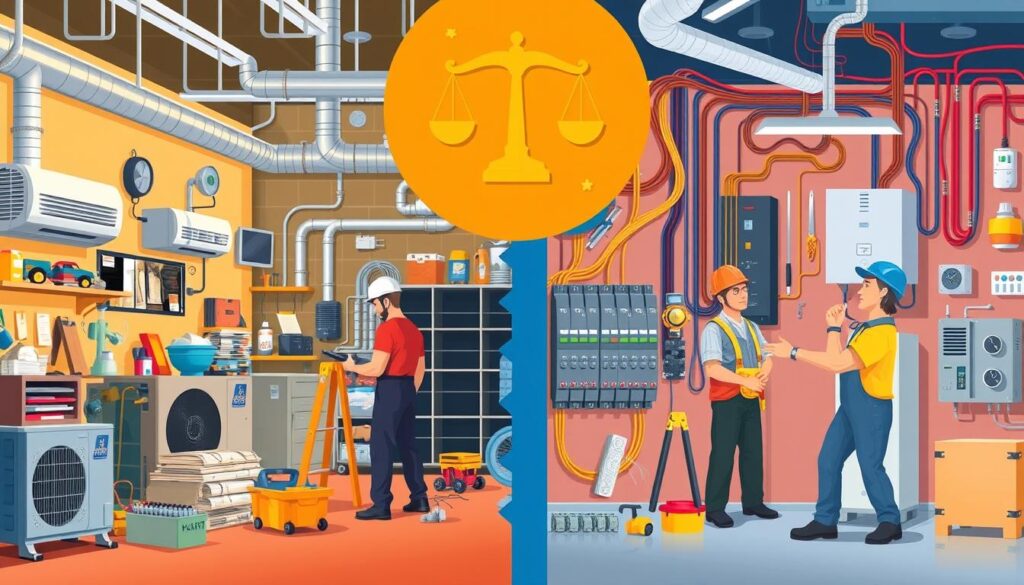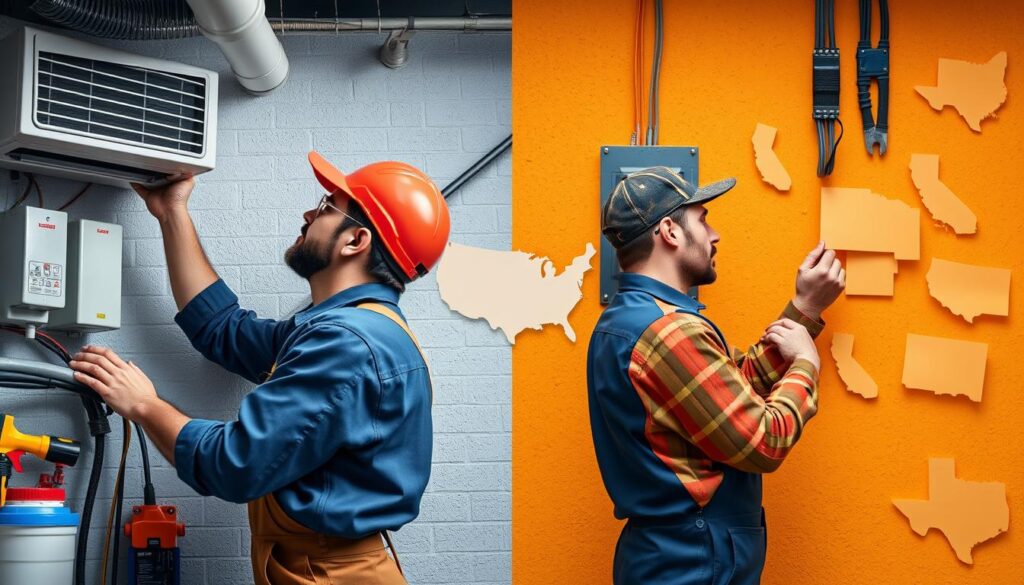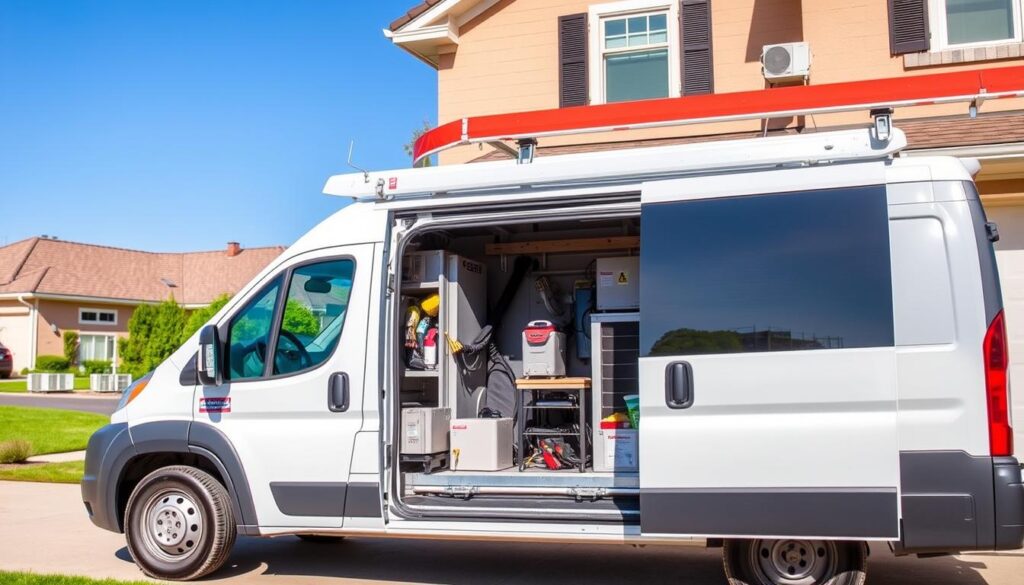Affiliate Disclosure
HVAC Guide Guys is a participant in the Amazon Services LLC Associates Program, an affiliate advertising program designed to provide a means for sites to earn advertising fees by advertising and linking to Amazon.
Do HVAC or Electricians Make More? As you explore the skilled trades, you might wonder, “Do HVAC or electricians make more?” This question is key when choosing a career. It can greatly affect your financial future. Let’s look into the salary differences between HVAC and electrical work.

In 2023, HVAC technicians made a median of $57,300 a year, or $27.55 an hour. Electricians, however, earned a median of $61,590 a year, or $28.87 an hour. This shows electricians generally earn more than HVAC technicians. But there’s more to the story.
Key Takeaways
- Electricians typically earn higher median annual wages compared to HVAC technicians.
- Job growth prospects are stronger for electricians, with a 9% projected growth rate by 2033.
- Factors like geographic location, industry specialization, and experience level can significantly influence salaries in both trades.
- Both HVAC and electrical work offer stable, in-demand career paths with opportunities for advancement and business ownership.
- Choosing between HVAC or electrical work should consider your personal interests, skills, and long-term career goals.
Table of Contents
Overview of HVAC and Electrician Career Paths
Two lucrative blue-collar careers stand out: HVAC and electrician jobs. HVAC technicians and electricians are key to our modern world. They keep our heating, cooling, and electrical systems running.
Role and Responsibilities of HVAC Technicians
HVAC technicians install, maintain, and fix heating, cooling, and refrigeration systems. They find problems, do regular checks, and replace broken parts. To become an HVAC tech, you need a 6-month to 2-year program. Many get certified by the North American Technician Excellence (NATE) to show their skills.
Core Duties of Licensed Electricians
Electricians install, repair, and keep electrical systems working in homes, businesses, and factories. They handle everything from new wiring to fixing power issues. To start, electricians do an apprenticeship for 4 to 5 years. Then, they get a license by passing a test.
Industry Demand and Growth Prospects
HVAC and electrician jobs are in high demand. They are expected to grow 6% from 2022 to 2032. As construction grows and green buildings become more popular, these careers offer stable, fulfilling jobs with chances to grow and specialize.
Explore Our HVAC Shop
Looking for top-rated HVAC tools, parts, and accessories? Visit our shop and find the perfect solution for your needs.
Visit the ShopCurrent Salary Trends in Both Trades
Technical careers in the skilled trades, like HVAC and electricians, offer competitive pay. HVAC technicians make between $42,731 and $50,590 a year. Electricians, on the other hand, earn between $52,720 and $60,040 annually. This shows electricians tend to earn more.
The highest earners in these fields also have impressive salaries. Top electricians can earn up to $90,420 a year. Meanwhile, the highest-paid HVAC professionals can reach $88,000 annually. These figures highlight the great earning potential in these technical careers and skilled trades.
| Occupation | Median Annual Salary | Lowest 10% Earnings | Highest 10% Earnings |
|---|---|---|---|
| Electricians | $61,590 | $38,470 | $104,180 |
| Plumbers | $61,550 | $38,690 | $103,140 |
| HVAC Technicians | $57,300 | $37,270 | $84,250 |
Salaries can change based on location, experience, and skills. Both HVAC and electrician jobs offer competitive compensation. They are great choices for those looking for technical careers with good skilled trades compensation.
Do HVAC or Electricians Make More: Salary Comparison
Both HVAC technicians and electricians have good earning potential in the trades. But, their salaries differ, and it’s interesting to see why.
Entry-Level Wage Differences
HVAC apprentices start at $14.52 to $28.56 per hour. Electrician apprentices begin at $14.21 per hour. HVAC apprentices might earn a bit more at first, but the range is wider for electricians.
Mid-Career Earning Potential
As they gain experience, the pay gap grows. HVAC technicians average $49,340 a year. Electricians make about $55,737 annually. So, electricians tend to earn more mid-career.
Top Earner Statistics
At the highest level, HVAC pros can earn up to $88,000 yearly. The top electricians can make up to $99,800. This shows electricians can earn more, especially the most skilled ones.
In summary, electricians generally earn more than HVAC technicians at all levels. This is due to their specialized skills, demand, and wages that vary by location.
Explore Our HVAC Shop
Looking for top-rated HVAC tools, parts, and accessories? Visit our shop and find the perfect solution for your needs.
Visit the ShopGeographic Salary Variations Across States
Location greatly affects the salaries of HVAC technicians and electricians. In the United States, wages vary widely. Some states pay much more than others.
HVAC technicians earn the most in states with high living costs and strong demand for climate control. Alaska, the District of Columbia, and Hawaii lead with salaries over $69,000. On the other end, Puerto Rico, Mississippi, and Arkansas pay less than $45,000.
For electricians, the top earners are in Illinois, New York, and Oregon, with salaries over $81,000. The lowest-paid states for electricians are similar to HVAC, with Puerto Rico, Mississippi, and Arkansas paying under $50,000.
These salary differences are due to local living costs, industry demand, and economic conditions. Before choosing a career in HVAC or electrical work, research the salaries in your area. This will help you understand your potential earnings.
| Highest Paying States for HVAC | Highest Paying States for Electricians |
|---|---|
| Alaska ($70,100) | Illinois ($83,140) |
| District of Columbia ($70,130) | New York ($81,700) |
| Hawaii ($69,100) | Oregon ($81,200) |
Knowing about salary variations helps HVAC technicians and electricians make better career choices. It lets them consider the potential earnings in different areas.

Explore Our HVAC Shop
Looking for top-rated HVAC tools, parts, and accessories? Visit our shop and find the perfect solution for your needs.
Visit the ShopEducation and Training Requirements
If you’re thinking about a career in skilled trades, like HVAC or electrician work, you should know about the education needed. Both fields offer good jobs with the chance for high earnings. But, the training and licenses needed are different.
HVAC Certification Path
To be an HVAC technician, you usually need a high school diploma. HVAC training lasts from 6 months to 2 years, leading to a certificate or associate’s degree. These programs teach you the theory and practical skills for working with heating, cooling, and refrigeration systems.
HVAC technicians must also finish 114 hours of training and 2,000 hours of paid work experience.
Electrician Licensing Process
To become an electrician, you need a high school diploma or GED. The journey to becoming a licensed electrician involves a 4-5 year apprenticeship. This combines classroom learning with real-world experience.
During the apprenticeship, you’ll get the same amount of education and work hours as HVAC technicians.
Time Investment for Each Career
Both HVAC and electrical careers offer paid apprenticeships and ongoing learning. HVAC programs can be finished in under 2 years. But, electrician apprenticeships take about 5 years.
Both trades require a lot of time to learn the skills and get the certifications needed to succeed in these technical careers.
“Employers report difficulty in finding HVAC Technicians with computer and electronic skills, underscoring the importance of comprehensive technical training for both HVAC and electrician careers.”
Work Environment and Job Conditions
Blue-collar earnings for HVAC technicians and electricians show the hard work they do. HVAC techs work in many places, like homes and schools. They might travel a lot. Electricians work in different places too, sometimes in tight spots or high up.
Both jobs need a lot of physical effort and can be risky. HVAC techs face the weather, while electricians deal with electrical dangers. It’s key to have good training and safety rules to stay safe.
| Work Environment Factors | HVAC Technicians | Electricians |
|---|---|---|
| Typical Work Settings | Homes, businesses, schools, hospitals, factories | Residential, commercial, industrial buildings |
| Physical Demands | Lifting, carrying, and installing equipment | Working in tight spaces, performing tasks at heights |
| Potential Safety Risks | Exposure to outdoor elements, HVAC-related hazards | Electrical hazards, working at heights |
| Training and Certification | HVAC certification programs, on-the-job training | Electrician licensing and apprenticeship programs |
Despite the hard work, HVAC techs and electricians find their jobs rewarding. They enjoy working with their hands and solving problems. It’s fulfilling to make a real difference in people’s lives.

Explore Our HVAC Shop
Looking for top-rated HVAC tools, parts, and accessories? Visit our shop and find the perfect solution for your needs.
Visit the ShopCareer Advancement Opportunities
Working as an HVAC technician or electrician opens many doors for career growth. Both fields offer chances to specialize and take on leadership roles. These opportunities can greatly increase your earning potential over time.
Specialization Options
HVAC technicians can focus on different areas like residential, commercial, or industrial systems, and even refrigeration. Electricians can also specialize in various fields, including residential, commercial, industrial, or low-voltage systems. Getting specialized training and certifications can lead to better-paying jobs and more responsibilities.
Leadership Positions
Both HVAC and electrical careers lead to supervisory roles, project management, or even starting your own business. By keeping learning, getting more certifications, and showing your leadership skills, you can move up to managerial positions. These roles come with higher pay and more career opportunities.
| Specialization | HVAC Technicians | Electricians |
|---|---|---|
| Residential | ✓ | ✓ |
| Commercial | ✓ | ✓ |
| Industrial | ✓ | ✓ |
| Refrigeration | ✓ | – |
| Low-Voltage Systems | – | ✓ |
Choosing any path, investing in your income potential by trade and growing your technical careers can lead to great rewards. These opportunities are available in the HVAC or electrical industry.
Benefits and Compensation Packages
Thinking about a career in skilled trades like HVAC or electrical work? The pay and benefits are quite good. You get health insurance, retirement plans, and paid vacation. These are key for job happiness and financial stability.
Employers in the skilled trades also offer cool perks. You might get tool allowances, company cars, or uniforms. Union jobs often come with extra benefits like job security and training.
Blue-collar earnings in these jobs can be as high as white-collar jobs. In Illinois, electricians make about $30 an hour, or $60,000 a year. Some can make over $100,000 with overtime and special skills.
These jobs are in high demand because they require less training than college. Apprenticeships let you learn and earn at the same time. They offer real-world experience and a clear path to becoming certified.
When looking at HVAC, electrician, and other skilled trades, think about the whole package. It’s not just the salary. The benefits, job security, and chances for growth make these careers very rewarding.
“The shortage of skilled workers entering the workforce has led to high demand and lucrative rewards for those in skilled trades.”
Conclusion
The debate on whether HVAC or electricians make more shows that electricians often earn more. Yet, both HVAC technicians and electricians can have good pay and job security. Location, experience, and skills greatly affect their earnings.
Both careers offer growth, advancement, and financial stability. Think about your interests, skills, and career goals. With the right training and dedication, you can succeed in either field, earning a good salary.
Both HVAC and electrician careers have bright futures. They are expected to grow faster than most jobs. Knowing the “HVAC vs. electrician pay” details helps you choose a rewarding career path.

